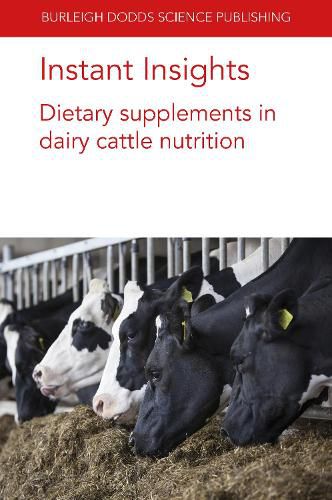Readings Newsletter
Become a Readings Member to make your shopping experience even easier.
Sign in or sign up for free!
You’re not far away from qualifying for FREE standard shipping within Australia
You’ve qualified for FREE standard shipping within Australia
The cart is loading…






This collection features five peer-reviewed reviews on dietary supplements in dairy cattle nutrition.
The first chapter addresses the manipulation of rumen fermentation to maximise the efficiency of feed utilisation and increase ruminant productivity. It considers a wide variety of approaches, including the use of dietary buffers.
The second chapter reviews the use of probiotics as supplements for ruminants to promote digestive efficiency and productivity. The chapter summarises the benefits and modes of action of probiotics, as well as their role in optimising feed efficiency and reducing methane production.
The third chapter considers the beneficial roles of plant secondary compounds in sustainable ruminant nutrition. It describes the effects and composition of the three major groups of plant secondary compounds: essential oils, tannins and saponins.
The fourth chapter discusses the growing need for alternative feed sources as a result of increasing demand for meat and dairy products. The chapter reviews the nutritional composition of seaweed and introduces it as a potential novel protein supplement in animal feeds.
The final chapter evaluates the role of macroalgae as a potential anti-methanogenic ruminant feed resource and reviews its impact on animal production and performance.
$9.00 standard shipping within Australia
FREE standard shipping within Australia for orders over $100.00
Express & International shipping calculated at checkout
This collection features five peer-reviewed reviews on dietary supplements in dairy cattle nutrition.
The first chapter addresses the manipulation of rumen fermentation to maximise the efficiency of feed utilisation and increase ruminant productivity. It considers a wide variety of approaches, including the use of dietary buffers.
The second chapter reviews the use of probiotics as supplements for ruminants to promote digestive efficiency and productivity. The chapter summarises the benefits and modes of action of probiotics, as well as their role in optimising feed efficiency and reducing methane production.
The third chapter considers the beneficial roles of plant secondary compounds in sustainable ruminant nutrition. It describes the effects and composition of the three major groups of plant secondary compounds: essential oils, tannins and saponins.
The fourth chapter discusses the growing need for alternative feed sources as a result of increasing demand for meat and dairy products. The chapter reviews the nutritional composition of seaweed and introduces it as a potential novel protein supplement in animal feeds.
The final chapter evaluates the role of macroalgae as a potential anti-methanogenic ruminant feed resource and reviews its impact on animal production and performance.